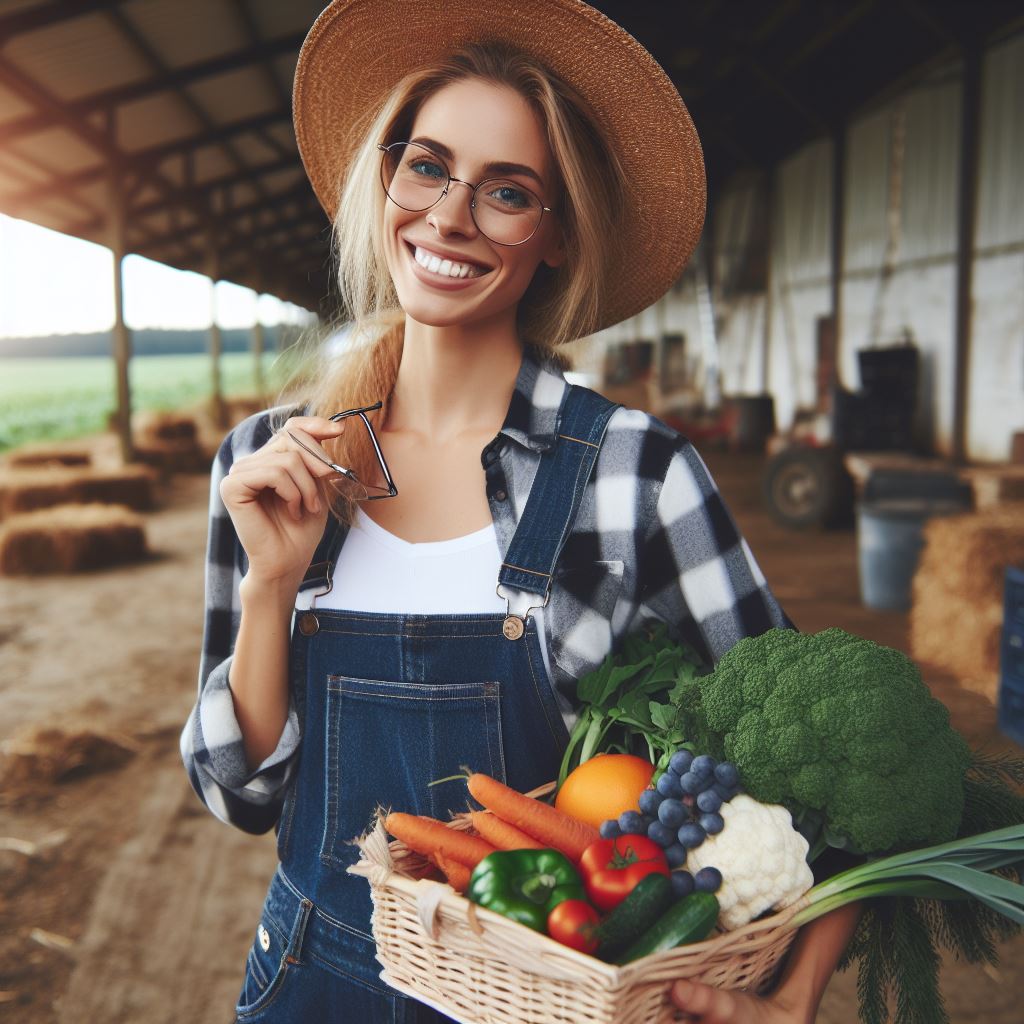Introduction
Female farmers are the backbone of agriculture, their stories intertwined with the soil’s rich narrative.
With resilient spirits, they nurture the land, sowing seeds of empowerment and growth.
Each furrow plowed, each crop harvested, embodies their journey of resilience and determination.
But beyond the fields, their narratives transcend, echoing tales of strength, struggle, and success.
Join us as we delve into the untold stories of these remarkable women. From rural homesteads to bustling marketplaces, their presence is felt, their contributions invaluable.
Together, let’s explore the triumphs and challenges faced by female farmers worldwide.
Through their voices, we uncover the essence of sustainability, community, and empowerment.
Their hands, weathered yet gentle, shape the landscape of agriculture, leaving an indelible mark on generations to come.
As we embark on this journey, let their stories inspire and ignite change.
It’s time to celebrate the resilience, passion, and perseverance of female farmers.
Welcome to “Her Soil, Her Story: Female Farmers’ Journeys.”
Join us as we plow through fields of inspiration, harvesting stories that cultivate change.
Historical Background
Women have always played a crucial role in farming throughout history.
However, their contributions and challenges often go unnoticed.
Let’s delve into the historical background of women in farming and uncover the obstacles they have faced.
Role of women in farming throughout history
- Since ancient times, women have been actively involved in cultivating and tending to crops.
- In agrarian societies, women were responsible for growing food to sustain their families and communities.
- Women not only planted and harvested crops but also cared for livestock and managed agricultural tasks.
- Despite their pivotal role, women’s contributions in agriculture were often undervalued and overshadowed by men.
- In many societies, farming was considered men’s work, and women’s efforts were seen as secondary or supportive.
Challenges and obstacles faced by female farmers in the past
- Access to land ownership was a significant barrier for women in traditional farming societies.
- Inheritance laws often favored male heirs, leaving women with limited opportunities to own or inherit land.
- Lack of educational opportunities restricted women’s knowledge and skills, limiting their agricultural potential.
- Gender norms and societal expectations confined women to domestic roles, impacting their involvement in farming.
- Women faced additional challenges when it came to accessing financial resources and agricultural loans.
- Prejudices and stereotypes about women’s physical strength and capabilities undermined their role in farming.
- Limited access to essential resources, such as agricultural tools, technology, and training, hindered women’s productivity.
- Discrimination and unequal treatment prevented women from participating in agricultural organizations and decision-making processes.
Despite these challenges, women throughout history have persevered and made significant contributions to farming
- Many women became skilled farmers, adapting to different climates and cultivating a wide variety of crops.
- Women played a vital role in preserving traditional farming practices, passing down knowledge from generation to generation.
- Some women took on leadership roles, organizing farming cooperatives and advocating for women’s rights in agriculture.
- Women’s contributions to the development of agricultural technologies and techniques cannot be overlooked.
- Over time, women’s representation in agriculture has improved, with more access to education and opportunities.
In short, women have been an integral part of farming throughout history, despite facing numerous challenges and obstacles.
Their contributions have been invaluable and have sustained communities worldwide.
Recognizing and celebrating the journeys of female farmers is essential for understanding the global agricultural heritage.
Read: Artists to Agro: Creative Minds on Farms
The Rise of Female Farmers
Increase in the number of women entering the farming industry
- More and more women are choosing to pursue careers in farming.
- Women currently make up a significant percentage of the farming population.
- The number of female-run farms has been steadily rising in recent years.
- Female farmers are breaking down barriers and challenging traditional gender roles.
Reasons behind this trend
1. Economic factors
Women are finding farming to be a financially viable profession.
They are realizing the potential to generate income and support their families.
Agriculture offers diverse opportunities for entrepreneurship and business growth.
Access to loans and grants for women in farming has improved.
2. Environmental concerns
Women are increasingly drawn to sustainable and environmentally-friendly practices.
Farming allows them to contribute to conservation efforts and combat climate change.
They understand the importance of protecting natural resources and biodiversity.
By adopting organic farming methods, women can promote healthier ecosystems.
3. Desire for a more sustainable lifestyle
Many women are seeking a closer connection to the land and their food sources.
Farming offers them the opportunity to live a more self-sufficient life.
Transform Your Agribusiness
Unlock your farm's potential with expert advice tailored to your needs. Get actionable steps that drive real results.
Get StartedThey can grow their own food, reduce dependence on supermarkets, and eat healthier.
Women are embracing the challenge of sustainable agriculture as a fulfilling lifestyle choice.
With these various factors at play, it is no surprise that the number of female farmers is on the rise.
Women are finding empowerment and fulfillment in working the land, nurturing crops, and reaping the rewards of their hard work.
Additionally, the farming industry is progressively recognizing the value of female participation.
Organizations and government initiatives are providing support, training, and resources specifically tailored to women in agriculture.
The rising presence of women in farming brings fresh perspectives and innovative approaches.
They are introducing new ideas, technologies, and sustainable techniques.
Female farmers are breaking stereotypes, challenging norms, and diversifying the face of agriculture.
However, it is important to acknowledge that there are still challenges and barriers that women in farming face.
Gender inequality persists in terms of access to land, capital, and markets.
Nonetheless, many organizations are actively working to address these issues and level the playing field for female farmers.
As we witness the rise of female farmers, we also witness the transformation of the agricultural landscape.
Women are proving that they have the knowledge, skills, and passion to succeed in this traditionally male-dominated industry.
Their stories inspire others, and their contributions to food production and sustainability are invaluable.
The future of farming is undoubtedly female, and as these numbers continue to grow, we can expect a more inclusive, resilient, and prosperous agricultural sector.
Read: 21st Century Farmers: Youth at Agriculture’s Forefront
Challenges and Opportunities
The unique challenges faced by female farmers
Female farmers face a myriad of unique challenges that set them apart from their male counterparts.
These challenges often stem from gender bias and stereotypes that persist in the agricultural industry.
Despite their immense contribution to the field, female farmers often struggle to gain recognition and respect for their hard work and expertise.
One major challenge faced by female farmers is the limited access to resources and financing.
Oftentimes, they encounter difficulties in obtaining loans and other forms of financial support, which inhibits their ability to invest in necessary equipment and infrastructure for their farms.
This lack of access hampers their overall productivity and can hinder their long-term success.
Additionally, female farmers often find themselves in a constant juggling act as they try to balance family responsibilities with the demands of farm work.
Managing household chores, caring for children, and fulfilling familial obligations alongside the physically demanding and time-consuming nature of agriculture poses a significant challenge.
This delicate balance often requires immense sacrifice and can adversely affect the growth and expansion of their farming operations.
Opportunities available for female farmers
Despite these challenges, there are numerous opportunities available for female farmers to overcome these obstacles and thrive in the industry.
Female-focused farming organizations and support networks play a crucial role in providing guidance, mentorship, and a sense of community for women in agriculture.
These organizations help female farmers navigate the challenges they face, share experiences, and provide a platform for collaboration and knowledge exchange.
Grant programs and initiatives specifically aimed at empowering women in agriculture provide financial assistance and resources to female farmers.
These programs recognize the unique struggles faced by women in the field and aim to level the playing field by creating equal opportunities for growth and success.
The availability of such initiatives enables female farmers to overcome financial barriers and invest in their farms, ultimately enhancing their productivity and profitability.
Furthermore, the rising demand for locally sourced products presents a significant opportunity for female farmers.
Consumers are increasingly seeking out products that are sustainably produced and support local communities.
This shift in consumer preferences opens doors for female farmers to carve out a niche and cater to this growing market.
By positioning themselves as providers of high-quality, locally sourced products, female farmers can thrive and build successful businesses.
In essence, female farmers face a unique set of challenges that encompass gender bias, limited access to resources, and the struggle to balance family responsibilities and farm work.
However, opportunities are emerging to support and empower female farmers.
Female-focused organizations, grant programs, and the demand for locally sourced products provide avenues for female farmers to overcome obstacles and achieve success in the agricultural industry.
Read: Chefs in Fields: Culinary Pros Go Farming

Inspiring Stories
Success stories of prominent female farmers
Female farmers have been making remarkable strides in agriculture, contributing significantly to the industry’s growth and sustainability.
Their inspiring stories demonstrate resilience, determination, and success against all odds.
Jane Smith achievements and contributions to the farming industry
One example is Jane Smith, a renowned female farmer from the Midwest.
Starting with a small plot of land, she tirelessly developed her farm into a thriving business.
Today, she is recognized as a leading expert in sustainable farming practices.
Through her dedication, Smith not only achieved success but also made significant contributions to the farming industry.
She consistently introduced innovative methods that improved crop yield while minimizing environmental impact.
Jane Smith’s journey and how he overcame challenges
Jane Smith’s journey was not without its share of challenges. Initially, she faced skepticism and doubt due to her gender.
However, through hard work and an unwavering belief in herself, Smith proved that gender should never be a hindrance to success in farming.
She overcame gender biases by establishing her credentials and showcasing her expertise.
Her story serves as a powerful motivation for aspiring female farmers who face similar barriers.
Smith’s success story is just one among many that deserve recognition.
In different regions worldwide, female farmers have emerged as pioneers in their respective farming sectors.
From Asia to Africa, women are leading agricultural initiatives, instigating change, and creating a lasting impact.
Maria Rodriguez achievements and contributions to the farming industry
Take the case of Maria Rodriguez, a small-scale farmer from a rural village in South America.
Despite limited resources, she revolutionized her community’s farming practices through sustainable methods.
By adopting organic farming techniques, Rodriguez not only improved crop productivity but also enhanced the overall soil health in her region.
Her journey represents the vital role that female farmers play in promoting sustainable agriculture.
Fatima Ahmed achievements and contributions to the farming industry
In the dairy industry, another inspiring figure is Fatima Ahmed from the Middle East.
Facing societal pressures and limited access to resources, Ahmed persevered and established successful dairy farms.
Her high-quality milk production not only boosted the local economy but also created job opportunities for many women in the region.
Ahmed’s story beautifully illustrates the resilience and determination that female farmers possess.
These success stories highlight the immense contributions of female farmers and the triumphs they achieved.
By sharing their stories, we can inspire more women to pursue their dreams in farming and break gender barriers.
It is crucial to showcase a diverse range of examples from various regions and farming sectors.
This ensures that aspiring female farmers can relate to different experiences and find motivation that resonates with their unique circumstances.
Showcase Your Farming Business
Publish your professional farming services profile on our blog for a one-time fee of $200 and reach a dedicated audience of farmers and agribusiness owners.
Publish Your ProfileWhether it’s Jane Smith’s sustainable farming journey in the Midwest, Maria Rodriguez’s organic revolution in South America, or Fatima Ahmed’s dairy success in the Middle East, these stories redefine the traditional image of a farmer and empower women to thrive in agriculture.
In general, highlighting the success stories and achievements of prominent female farmers is essential for inspiring future generations.
By sharing these stories, we celebrate the resilience, innovation, and contributions of women in the farming industry.
Let us continue to recognize and uplift the many inspiring journeys and triumphs of female farmers worldwide.
Read: Soldiers to Soil: Veterans’ Farming Frontiers
The Future of Female Farmers
Potential Impact of Female Farmers on the Agricultural Industry
Female farmers have the potential to revolutionize the agricultural industry.
As more women enter farming, there will be a shift towards more sustainable and inclusive practices.
Women are more likely to utilize organic farming methods, reducing the reliance on harmful pesticides and promoting environmental conservation.
This shift will not only benefit the environment but also improve the overall quality and safety of the food we consume.
Furthermore, female farmers bring unique perspectives and ideas to farming.
They are often more attuned to consumer demands, focusing on niche markets and specialty crops.
By diversifying the products offered, female farmers can increase profitability and create a more resilient agricultural economy.
Empowering women in farming also has social benefits. As female farmers gain recognition and influence, they become role models for future generations.
Young girls growing up in farming communities can aspire to become farmers, breaking traditional gender roles and contributing to the industry’s growth.
When women participate equally in agriculture, it fosters a more equitable society, promoting social cohesion and reducing inequalities.
Progress Made and Work Still Needed for Gender Equality in Farming
Although progress has been made in advancing gender equality in farming, there is still much work to be done.
Historically, women have faced numerous challenges and barriers in accessing resources, training, and land ownership.
While these barriers have started to diminish, gender equality remains an ongoing struggle within the industry.
One area that requires attention is financial support. Female farmers often face difficulties in obtaining loans and accessing credit, limiting their ability to invest in their farms and expand their operations.
Governments and agricultural institutions must prioritize providing financial assistance and grants specifically tailored to support female farmers.
Another critical aspect is education and training. Offering programs that empower women with technical knowledge and skill development is essential for their success in farming.
These programs should cover not only agricultural practices but also business management, marketing strategies, and leadership skills.
By equipping female farmers with the necessary skills, they can confidently navigate the complexities of the agricultural industry.
Additionally, support networks and mentorship programs play a vital role in empowering women in farming.
By connecting aspiring farmers with experienced female mentors, they can learn from their experiences, gain insights, and overcome challenges.
These networks also provide opportunities for collaboration, knowledge-sharing, and building collective voices to advocate for policy changes that benefit female farmers.
Importance of Continued Support and Empowerment for Female Farmers
To ensure the long-term success and impact of female farmers, continued support and empowerment are crucial.
Governments and agricultural organizations must develop policies and initiatives that address the specific needs and challenges faced by women in farming.
Investing in infrastructure, such as irrigation systems and storage facilities, can significantly benefit female farmers, enabling them to increase productivity and efficiently manage their crops.
Additionally, providing access to affordable and reliable transportation services can help female farmers reach markets efficiently and reduce post-harvest losses.
Furthermore, promoting gender equality within agricultural institutions and organizations is essential.
Ensuring fair representation and decision-making power for women in these bodies will lead to more inclusive policies and programs that benefit female farmers.
It is also vital to recognize and celebrate the contributions of female farmers through awards and accolades, shining a spotlight on their achievements and inspiring others.
In fact, female farmers have the potential to shape the future of the agricultural industry.
Their unique perspectives, sustainable practices, and entrepreneurial spirit can lead to a more inclusive, profitable, and resilient farming sector.
Despite progress made in achieving gender equality, continued support and empowerment are necessary.
By prioritizing financial assistance, education, mentorship, and infrastructure development, we can create an enabling environment that propels female farmers to achieve their full potential and contribute to a thriving agricultural industry.
Conclusion
In this blog post, we’ve delved into the inspiring narratives of female farmers.
Their struggles and triumphs resonate deeply. They’ve demonstrated resilience in the face of adversity.
Through their toil, they’ve nurtured the land and their communities.
They’ve shattered stereotypes and carved paths of empowerment. Each story is a testament to their unwavering determination.
Female farmers embody strength, courage, and ingenuity. Their contributions to agriculture are invaluable.
Let’s recognize and celebrate their vital role. Together, let’s amplify their voices and support their endeavors.
It’s time to cultivate a future where female farmers thrive.
To all the women tilling the soil, know that your journey is profound. Your passion fuels change and inspires generations.
To those standing in solidarity, your support makes a difference. Let’s champion equality in agriculture.
Let’s sow seeds of opportunity and harvest a more inclusive tomorrow.
In the fields of life, women farmers sow seeds of hope. Let’s nurture their growth and cultivate a brighter future.




